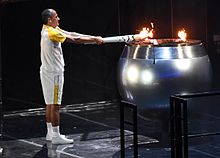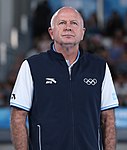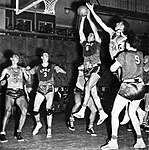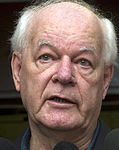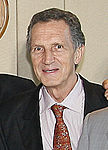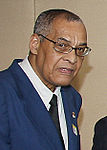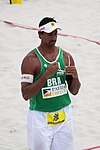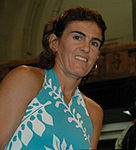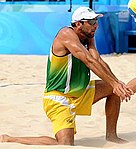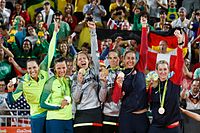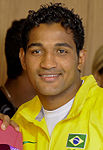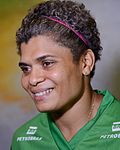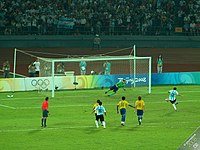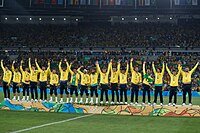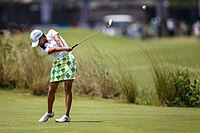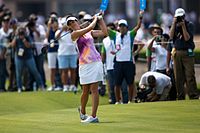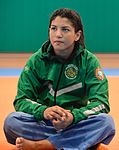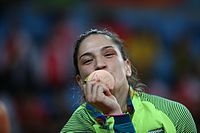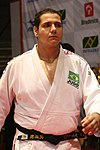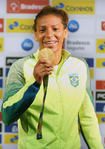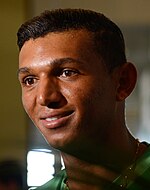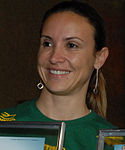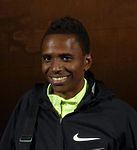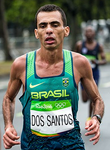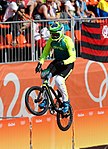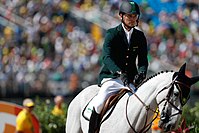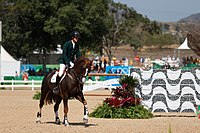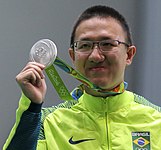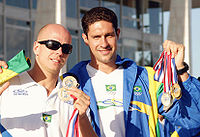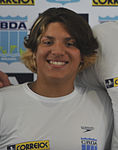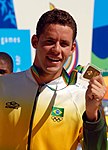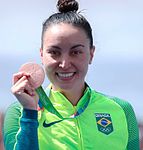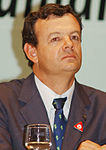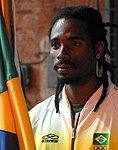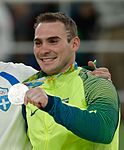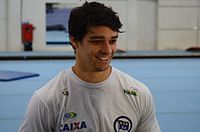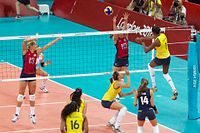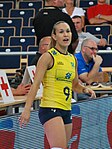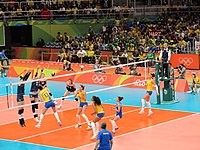Olympic history of Brazil
|
|
|
|
|---|---|---|
| 30th | 36 | 63 |
Brazil , whose NOK , the Comitê Olímpico Brasileiro , was founded in 1935, first took part in the Olympic Games in 1920. Since then, with the exception of the 1928 Games, athletes have been sent to all summer games. Brazil has also been taking part in the Winter Games since 1992.
General overview of the participations
Brazil's first participation in the Olympic Games took place in Antwerp in 1920. As early as 1900, Adolphe Klingelhoefer was a Brazilian. But he is not listed as a participant of Brazil by the IOC or the Brazilian NOK. Klingelhoefer was born in Paris on May 5, 1880, the son of a Brazilian diplomat. He was a member of the Racing Club de France and competed in three disciplines of athletics in 1900. In 2009, a sports historian was able to prove that Klingelhoefer was a Brazilian citizen, but he is still listed as a French citizen. The first official Olympians in 1920 were the marksmen Guilherme Parãense , Afrânio da Costa, Sebastião Wolf, Fernando Soledade, Demerval Peixoto, Dario Barbosa and Mário Maurity, who competed on August 2, 1920. The first woman from Brazil to attend the Olympic Games in Los Angeles in 1932 was swimmer Maria Lenk , who competed in the 100 meter freestyle on August 7, 1932.
The first winter athlete in Brazil at the Winter Olympics was on February 9, 1992 in Albertville Lothar Munder in downhill skiing. On February 18, 1992, Evelyn Schuler became the first woman in the country to compete in the Super-G at the Winter Games.
The first medals were won in Antwerp in 1920. The first medal winner was the shooter Afrânio da Costa, who won the silver medal with the free pistol. The first Olympic champion was his teammate Guilherme Parãense , who won with the military pistol. So far, no medal has been won at the Winter Games.
The first Olympic team consisted of twelve athletes. The team size grew more and more and reached its peak in Helsinki in 1952 with 97 participants.
1980 in Moscow for the first time more than 100 participants were sent. In 1996 in Atlanta there were more than 200 for the first time. 13 athletes were in Sochi in 2014: Brazil's record number of participants at the Winter Games. By far the largest delegation with 465 athletes was used at the 2016 home games in Rio de Janeiro. The largest delegation to attend outside the home country was sent to Beijing in 2008. A total of 268 athletes took part here.
The most successful participant is the sailor Robert Scheidt , who won two gold, two silver and one bronze medal between 1996 and 2016. Torben Grael , also a sailor, also won five medals between 1984 and 2004. He was also a two-time Olympic champion, but won one silver and two bronze medals. The most successful team is the men's national volleyball team. Since 1984 they have won three gold and three silver medals. The women contributed two gold and two bronze medals. The most successful sport, however, is sailing. Brazilian sailors won a total of 18 medals: seven gold, three silver and eight bronze medals. The beach volleyball players won the most silver medals with seven, and the judoka won the most bronze medals with 15, and they also won the most medals overall, namely 22.
The most successful participation took place in 2016 in Rio de Janeiro. At the home games, the Brazilian athletes won 19 medals, including seven gold, six silver and six bronze medals.
Overview of the participations
Summer games
| year | Athletes | Flag bearer | Medals | ||||||
|---|---|---|---|---|---|---|---|---|---|
| total | m | w |
|
|
|
total | rank | ||
| 1896 | not participated | ||||||||
| 1900 | 1 | 1 | 0 | ||||||
| 1904-1912 | not participated | ||||||||
| 1920 | 16 | 16 | 0 | Afrânio da Costa | 1 | 1 | 1 | 3 | 15th |
| 1924 | 11 | 11 | 0 | Alfredo Gomes | |||||
| 1928 | not participated | ||||||||
| 1932 | 50 | 49 | 1 | Lúcio de Castro | |||||
| 1936 | 73 | 67 | 6th | Sylvio Padilha | |||||
| 1948 | 70 | 59 | 11 | Sylvio Padilha | 1 | 1 | 34 | ||
| 1952 | 97 | 92 | 5 | Mario Jorge | 1 | 2 | 3 | 24 | |
| 1956 | 47 | 46 | 1 | Adhemar da Silva | 1 | 1 | 24 | ||
| 1960 | 72 | 71 | 1 | Adhemar da Silva | 2 | 2 | 39 | ||
| 1964 | 61 | 60 | 1 | Wlamir Marques | 1 | 1 | 35 | ||
| 1968 | 76 | 73 | 3 | João Gonçalves Filho | 1 | 2 | 3 | 35 | |
| 1972 | 81 | 78 | 3 | Luiz Cláudio Menon | 2 | 2 | 41 | ||
| 1976 | 79 | 72 | 7th | João Carlos de Oliveira | 2 | 2 | 36 | ||
| 1980 | 106 | 91 | 15th | João Carlos de Oliveira | 2 | 2 | 4th | 17th | |
| 1984 | 147 | 126 | 21st | Eduardo de Souza | 1 | 5 | 2 | 8th | 19th |
| 1988 | 160 | 127 | 33 | Wálter Carmona | 1 | 2 | 3 | 6th | 24 |
| 1992 | 182 | 132 | 50 | Aurélio Miguel | 2 | 1 | 3 | 25th | |
| 1996 | 221 | 156 | 65 | Joaquim Cruz | 3 | 3 | 9 | 15th | 25th |
| 2000 | 198 | 106 | 92 | Sandra Pires | 6th | 6th | 12 | 53 | |
| 2004 | 243 | 124 | 119 | Torben Grael | 5 | 2 | 3 | 10 | 16 |
| 2008 | 268 | 139 | 129 | Robert Scheidt | 3 | 4th | 10 | 17th | 22nd |
| 2012 | 248 | 131 | 117 | Rodrigo Pessoa | 3 | 5 | 9 | 17th | 22nd |
| 2016 | 465 | 256 | 209 | Yane Marques | 7th | 6th | 6th | 19th | 13 |
| total | 30th | 36 | 63 | 129 | 35 | ||||
Winter games
| year | Athletes | Flag bearer | Medals | ||||||
|---|---|---|---|---|---|---|---|---|---|
| total | m | w |
|
|
|
total | rank | ||
| 1924-1988 | not participated | ||||||||
| 1992 | 7th | 6th | 1 | Hans Egger | |||||
| 1994 | 1 | 1 | 0 | Lothar Munder | |||||
| 1998 | 1 | 1 | 0 | Marcelo Apovian | |||||
| 2002 | 10 | 8th | 2 | Mirella Arnhold | |||||
| 2006 | 9 | 6th | 3 | Isabel Clark | |||||
| 2010 | 5 | 2 | 3 | Isabel Clark | |||||
| 2014 | 13 | 6th | 7th | Jaqueline Mourão | |||||
| 2018 | 9 | 6th | 3 | Edson Bindilatti | |||||
| total | 0 | 0 | 0 | 0 | - | ||||
Application and hosting of the Olympic Games
Applications

v. l. From right: Sports Minister Orlando Silva , President Luiz Inácio Lula da Silva , President of the OK Carlos Arthur Nuzman , football legend Pelé , Mayor Eduardo Paes , Finance Minister Henrique Meirelles and Sérgio Cabral Filho , former Governor of the State of Rio de Janeiro
Rio de Janeiro has applied to host the Summer Olympics six times. In addition, Rio submitted an application for the 1956 Equestrian Games, as the equestrian competitions could not be held in Melbourne , Australia, due to the strict quarantine regulations for horses .
Rio's first application was for the 1936 Games. Rio did not get a single vote in the first ballot. The same was the case with the application for the 1940 Games. The application for the 1956 Reiterspiele was also unsuccessful in the first ballot, but eight votes were received. Without a vote in the first ballot, Rio was eliminated from the bid for the 1960 Games. Applications for the 2004 and 2012 Games were not accepted and rejected by the IOC. In the election to host the 2016 Games, Rio won the third ballot with 66:32 votes over Madrid .
An application from the Brazilian capital, Brasília, to host the 2000 Games has been withdrawn.
Alignment
Brazil was the first South American country to host the Olympic Games. The opening ceremony took place on August 5, 2016 in Rio de Janeiro . Individual games of the Olympic football tournament were played on August 3rd and 4th. The Olympic flame was lit by Vanderlei de Lima , 2004 bronze medalist in the marathon. The Olympic oath was spoken for the active by the sailor Robert Scheidt . The referee's oath was taken by Martinho Nobre and the coach by Adriana Santos.
IOC members
Brazil has two IOC members. Carlos Arthur Nuzman , President of the Brazilian NOK, was a member from 2000 to 2013. He has been an honorary member since 2013. In 2013, Bernard Rajzman was elected an IOC member. Rajzman was a member of the 1984 volleyball team that won silver in Los Angeles.
Overview of the sports
Summer games
badminton
|
|
|
|
|---|---|---|
| - | - | - |
Brazil first took part in Olympic badminton in 2016. The first husband was Ygor Coelho , the first wife Lohaynny Vicente . Both were eliminated after the group stage with two defeats each.
basketball
|
|
|
|
|---|---|---|
| - | 1 | 4th |
In 1936 in Berlin, a Brazilian team took part in the Olympic basketball tournament for the first time. The tournament ended in 9th place for Brazil with one win and three defeats, but success was already evident at the next tournament in London in 1948. Brazil's team won the bronze medal. In the group stage, Brazil took five wins in five games. In the quarterfinals, Czechoslovakia was defeated 28:23, in the semifinals they defeated France 33:43. In the bronze medal match, Brazil beat Mexico 52:47.
1952 in Helsinki there were defeats against Argentina (first group stage) and the Soviet Union and the USA (second group stage). As a result, it was only enough for Brazil to play the placement games where they reached 6th place. The 1956 tournament in Melbourne was just as disappointing. After three defeats in the quarter-finals, which were carried out in four groups, they could only claim 6th place in the placement round.
1960 in Rome began the most successful period for Brazil's selection to date. In Rome, Brazil reached the final round after five wins in five games. They were first defeated by the Soviet Union (62:64). The second round win over Italy was carried over into the final round, so the last game was against the USA. The game was lost at 63:90, but it was enough for the bronze medal. In 1964 in Tokyo, Brazil won bronze again. In the semifinals they lost to the USA with 47:53. In the bronze medal match, Puerto Rico was beaten 76:60. In Mexico City 1968, Brazil reached the semi-finals for the third time in a row. Again they met the USA, again there was a defeat (63:75). The bronze game was also lost, this time against the Soviet Union (53:70).
After this successful period, Brazil did not succeed for a while. In 1972 in Munich the team finished seventh. For the 1976 Games in Montreal Brazil could not qualify. In 1980 in Moscow, Brazil finished fifth. In Los Angeles 1984 there was only one win in the preliminary round, but four defeats, including against the FRG (75:78). The placement games were won, Brazil took 9th place. In 1988 in Seoul, the team returned to 5th place after a quarter-final defeat against the Soviet Union (105: 110).
Also place 5 jumped out in 1992 in Barcelona. This time the team failed in the quarterfinals with 96: 114 to Lithuania. In Barcelona, a women's team took part in the tournament for the first time. They finished 7th out of eight teams. The women did better in 1996 in Atlanta. The team reached the semi-finals, beating Ukraine 81:60. In the final against the USA there was an 87: 111 defeat. The men's team was beaten for the third time in a row in the quarter-finals. This time the USA was the opposing team, which won with 98:75. In the placement round it was enough for Brazil to place 6.
In Sydney 2000 only the women's team started. Like four years earlier, she reached the semi-finals in Atlanta, where she failed with 52:64 to Australia. In the bronze medal match, South Korea was beaten 84:73. Also in 2004 in Athens only the women's team was qualified. For the third time in a row, the team made it to the semi-finals. As in Sydney, Australia was the opponent and, like four years ago, Brazil lost, this time with 75:88. In the bronze medal match, the Russians were stronger and beat Brazil 71:62.
In Beijing 2008, the Brazilian women's team finished eleventh out of twelve places. The men were again not qualified. The men's team was not back until 2012 in London. In the quarterfinals they met Argentina and lost with 77:82. The placement games were won, so it was enough to place 5. This time the women were ninth of twelve teams. At the domestic games in Rio de Janeiro in 2016, both teams could not reach the quarter-finals and were eliminated in the preliminary rounds.
| Surname | Games | discipline | annotation |
|---|---|---|---|
| National team of women | 1996 Atlanta | Women's tournament | first women's medal |
| Surname | Games | discipline | annotation |
|---|---|---|---|
| National team of men | 1948 London | Men's tournament | first men's medal |
| National team of men | 1960 Rome | Men's tournament | |
| National team of men | 1964 Tokyo | Men's tournament | |
| National team of women | 2000 Sydney | Women's tournament |
Wlamir Marques (2009)
Oscar Schmidt , five-time Olympic participant 1980 to 1996 (photo from 2006)
Beach volleyball
|
|
|
|
|---|---|---|
| 3 | 7th | 3 |
Brazil was already successful when the sport was held for the first time in 1996. While both male duos were eliminated in the third round. there was a purely Brazilian final for women. The duo Sandra Pires / Jackie Silva beat the duo Mônica Rodrigues / Adriana Samuel in two sets.
Four years later in Sydney there were three medals. In the men's category, the duo Zé Marco / Ricardo Santos reached the final after a semi-final victory over the German duo Jörg Ahmann / Axel Hager and lost to the US players Dain Blanton / Eric Fonoimoana and won silver. In the women's category, both duos reached the semi-finals. Shelda Bede / Adriana Behar won, Pires / Silva lost to their opponents. In the match for bronze, however, Pires / Silva were able to beat their Japanese opponents. In the final, Bede / Behar lost to the Australian duo Natalie Cook / Kerri Pottharst .
In Athens 2004, a duo each reached the finals for men and women. The male duo Ricardo Santos / Emanuel Rego won over the Spanish duo in two sets. In the women's category, the duo Bede / Behar was defeated by the Americans Kerri Walsh / Misty May-Treanor , winning bronze for the second time in a row.
The 2008 tournament in Beijing was disappointing for the women. The duo Ana Paula Connelly / Larissa França lost in the quarter-finals, their comrades Talita Antunes / Renata Ribeiro failed in the semifinals and also lost the game for the bronze medal. In the men's semi-finals, both Brazilian duos faced each other. Márcio Araújo / Fábio Luiz defeated Santos / Rego, but lost in the final to the Americans Todd Rogers / Phil Dalhausser . Santos / Rego won the game for bronze against their Georgian opponents.
In 2012 in London, the German duo Julius Brink / Jonas Reckermann could not be beaten by either Brazilian team. In the quarterfinals Brink / Reckermann defeated Pedro Cunha / Ricardo Santos , in the final they defeated Alison Cerutti / Emanuel Rego . In the women's category, Juliana da Silva / Larissa França reached the semi-finals, lost it and defeated the Chinese Xue Chen / Zhang Xi in the bronze medal match .
Alison Cerutti / Bruno Oscar Schmidt won the men's final in Rio de Janeiro in 2016. In the women's category, both duos failed because of the later Olympic champions Laura Ludwig / Kira Walkenhorst . In the semifinals, Antunes / França lost to the German duo. The Brazilians then also lost the game for bronze. In the final, Ágatha Bednarczuk / Bárbara Seixas also lost to the Germans.
With 13 medals won in this sport, Brazil is the most successful nation in terms of the number of medals. Measured in terms of Olympic victories, the USA is more successful with six wins compared to three wins for Brazil.
| Surname | Games | discipline | annotation |
|---|---|---|---|
|
Sandra Pires Jackie Silva |
1996 | Women's tournament | first Olympic victory, first ever medal win |
|
Emanuel Rego Ricardo Santos |
2004 Athens | Men's tournament | first men's Olympic victory |
|
Alison Cerutti Bruno Oscar Schmidt |
2016 Rio de Janeiro | Men's tournament |
| Surname | Games | discipline | annotation |
|---|---|---|---|
|
Mônica Rodrigues Adriana Samuel |
1996 Atlanta | Women's tournament | |
|
Zé Marco Ricardo Santos |
2000 Sydney | Men's tournament | first men's medal |
|
Shelda Bede Adriana Behar |
2000 Sydney | Women's tournament | |
|
Shelda Bede Adriana Behar |
2004 Athens | Women's tournament | |
|
Márcio Araújo Fábio Luiz |
2008 Beijing | Men's tournament | |
|
Alison Cerutti Emanuel Rego |
2012 London | Men's tournament | |
|
Ágatha Bednarczuk Bárbara Seixas |
2016 Rio de Janeiro | Women's tournament |
| Surname | Games | discipline | annotation |
|---|---|---|---|
|
Sandra Pires Adriana Samuel |
2000 Sydney | Women's tournament | |
|
Emanuel Rego Ricardo Santos |
2008 Beijing | Men's tournament | |
|
Larissa França Juliana da Silva |
2012 London | Women's tournament |
Archery
|
|
|
|
|---|---|---|
| - | - | - |
Emilio Dutra e Mello and Zélia Arci were the first Brazilian athletes in this sport at the Olympic Games. Both competed in Moscow in 1980. Dutra e Mello reached number 27, Arci number 28. Dutra e Mello also participated in 1984 in Los Angeles, 1988 in Seoul and 1992 in Barcelona. No archers competed in 1996, 2000 and 2004.
Six shooters competed in 2016. For the first time, Brazil also took part in the team competitions. Reaching the round of 16 with both teams and Ane Marcelle dos Santos in the women's singles marked the best results so far in this sport.
Boxing
|
|
|
|
|---|---|---|
| 1 | 1 | 3 |
Manoel do Nascimento was the first Brazilian boxer. He competed in bantamweight in London in 1948. Success did not materialize in the period that followed, even if Brazilian boxers competed regularly at the Olympic Games. Until 1964, no boxer got further than the quarterfinals. 1968 in Mexico City Servilio de Oliveira reached the semifinals in the flyweight division. He lost his fight against the eventual Olympic champion Ricardo Delgado from Mexico. With his bronze medal, Oliveira became the first Brazilian medalist in boxing. Further successes were not achieved until 2012 in London. Esquiva Florentino won silver in the middleweight division, while his brother Yamaguchi Falcão won bronze in the light heavyweight division. Women's boxing was held for the first time in London. Adriana Araújo was one of the first Brazilian women in the ring in the lightweight division. She won the bronze medal in her weight class.
Robson Conceição achieved the first Olympic victory in boxing in Rio de Janeiro in 2016 . The lightweight defeated the French Sofiane Oumiha on points in the final .
| Surname | Games | discipline | annotation |
|---|---|---|---|
| Robson Conceição | 2016 Rio de Janeiro | lightweight | first Olympic champion in boxing |
| Surname | Games | discipline | annotation |
|---|---|---|---|
| Esquiva Florentino | 2012 London | medium weight |
| Surname | Games | discipline | annotation |
|---|---|---|---|
| Servilio de Oliveira | 1968 Mexico City | Flyweight | first medal win |
| Yamaguchi Falcão | 2012 London | Light heavyweight | |
| Adriana Araújo | 2012 London | lightweight | first medal win by a woman |
fencing
|
|
|
|
|---|---|---|
| - | - | - |
In fencing, Brazilians first competed in all three types of fencing in Berlin in 1936. The foil fencers Ricardo Vagnotti, Ferdinando Alessandri and Moacyr Dunham were the first fencers in Brazil on August 1, 1936. Hilda von Puttkammer was Brazil's first female fencer at the Olympic Games. By reaching the quarter-finals, she achieved the best result in Brazil until 2012.
Only in Rio de Janeiro could Brazilian fencers advance to the quarter-finals. This was achieved by the foil fencer Guilherme Toldo and the foil team, which came in 8th in the placement rounds.
Soccer
|
|
|
|
|---|---|---|
| 1 | 5 | 2 |
Brazil sent a soccer team to the 1952 Olympic tournament for the first time. The team reached the quarter-finals and lost to Germany 2-4. In 1960 Brazil were eliminated after the group stage. After two wins and one defeat (against Italy), the team finished second in the group. Since only the first in the group qualified for the semi-finals, Brazil was eliminated.
In 1964, too, the team failed to survive the group stage. After a win, a draw and a defeat, Brazil had to leave. There were two draws and one defeat in the 1964 Olympic tournament after the group stage. Brazil left early again. 1972 came off even worse. One draw and two defeats meant the last place in the group.
The unsuccessful situation in Brazil only ended in 1976. The team reached the semi-finals, but lost there 0-2 against Poland. In the game for bronze, the Soviet Union also lost 2-0. In 1980, Brazil failed to qualify for the tournament. In 1984 they were there again and made it to the final. In the preliminary round they had been able to beat Germany 1-0 in the group game. In the quarterfinals, Brazil could only prevail against Canada on penalties. It was the first game in an Olympic tournament to be decided by a penalty shoot-out . In the semi-finals Italy were defeated 2-1 after extra time. In the final, Brazil lost 2-0 to France.
In 1988 Brazil reached the final as well. After a preliminary round without losing points, they met Argentina in the quarter-finals. Brazil won 1-0. In the semifinals, the FRG was the opponent. After a 1-1 draw after extra time, it went to penalties, which Brazil won 4-3. In the final, Brazil lost to the Soviet Union 2-1 after extra time. Brazil could not qualify for the 1992 tournament.
In 1996 a women's team took part for the first time. The men reached the quarter-finals without losing points and defeated Ghana 4-2. In the semi-finals they lost to Nigeria 3: 4 after extra time. In the game for the bronze medal Portugal was beaten 5-0. The women qualified for the semi-finals with one win and two draws, including a 1-1 draw against Germany. Here they lost 3-2 to China. The Brazilians also lost the game for bronze. There was a 2-0 defeat against Norway.
In the 2000 Olympic tournament, the men reached the quarter-finals, where they lost 2-1 after extra time to Cameroon. The women qualified for the semi-finals despite a 2-1 defeat against Germany in the preliminary round. Here they lost 0: 1 to the Americans. In the game for bronze they met Germany again and lost again, this time 0-2.
The men failed to qualify for the 2004 tournament. The women qualified for the quarter-finals with two wins. Here they beat Mexico 5-0 and Sweden 1-0 in the semi-finals. In the final there was a duel against the USA. The US women won 2-1 after extra time, the Brazilians won their first medal with silver.
In 2008 the men were there again. After three wins in the preliminary round, they met Cameroon in the quarter-finals, as in 2000. Again there was an extension, but this time Brazil won 2-0. The semi-final opponent was Argentina, who beat Brazil 3-0. In the bronze medal match, Brazil beat Belgium 3-0. The women met Germany again in the preliminary round. The game ended 0-0. With two wins they moved into the quarter-finals. Opponents Norway were defeated 2-1. In the semifinals there was a second duel against Germany. The Brazilians triumphed 4-1. As in 2004, they lost to the USA in the final, this time 1-0 after extra time.
In 2012, the men's team reached the quarter-finals with three wins. Opponents Honduras were defeated 3-2. In the semifinals there was a 3-0 victory over South Korea. In the final, Brazil met Mexico, which surprisingly won 2-1. The women's team won the preliminary round twice, but lost to hosts Great Britain. This time it was over in the quarter-finals, the Brazilians defeated Japan 2-0.
Two gold medals were expected in their own country in 2016. The men started the tournament with two draws in the group stage. Against South Africa and Iraq it was only enough to score 0-0. They then won against Denmark 4-0. The quarter-finals against Colombia were won 2-0, the semi-finals against Honduras 6-0. In the final there was a duel against Germany, which was eagerly awaited in their own country after the 1: 7 debacle in the 2014 World Cup semi-finals. Captain Neymar brought his team 1-0 lead, but the Germans equalized after an hour through Meyer . After 90 minutes it was 1-1, the extra time brought no change. The first four shooters met in the penalty shootout for both teams. Goalkeeper Wéverton saved Petersen's penalty , Neymar converted his penalty and gave Brazil their first gold medal in football.
With two wins and one draw (again a 0-0 win against South Africa), the women qualified for the quarter-finals against Australia. After 120 minutes it was 0-0 and the Brazilians won the penalty shoot-out 7-6. The semi-final against Sweden also had to be decided on penalties after it was again 0-0 after 120 minutes. The Swedes won 4: 3. The disappointed Brazilians then also lost the game for bronze against Canada with 1: 2.
| Surname | Games | discipline | annotation |
|---|---|---|---|
| Men's U-23 national team | 2016 Rio de Janeiro | Men's tournament | first Olympic victory in football |
| Surname | Games | discipline | annotation |
|---|---|---|---|
| National team of men | 1984 Los Angeles | Men's tournament | first men's medal |
| National team of men | 1988 Seoul | Men's tournament | |
| National team of women | 2004 Athens | Women's tournament | first women's medal |
| National team of women | 2008 Beijing | Women's tournament | |
| Men's U-23 national team | 2012 London | Men's tournament |
| Surname | Games | discipline | annotation |
|---|---|---|---|
| Men's U-23 national team | 1996 Atlanta | Men's tournament | |
| Men's U-23 national team | 2008 Beijing | Men's tournament |
Pretinha , silver 2004 and 2008
Cristiane , silver 2004 and 2008
Formiga , five-time Olympic participant, silver 2004 and 2008
2008 men's semi-finals: Lionel Messi (blue and white jersey) in a duel with Marcelo (6) and Anderson (7)
76th minute of the 2008 semi-final against Argentina: Riquelme converts a penalty to make it 3-0
Érika in the 2012 tournament
Scene from the 2016 preliminary match against Denmark: Renato Augusto in a duel with four Danes
Final 2016: Neymar (10) pulls, Jeremy Toljan (2) tries to block. In the background Luan Vieira (7)
Weightlifting
|
|
|
|
|---|---|---|
| - | - | - |
The first Brazilian weightlifters competed in three weight classes in Helsinki in 1952. In the period that followed, everyone had no chance. In 2000, a Brazilian competed in weightlifting for the first time. It wasn't until Rio de Janeiro in 2016 that weightlifters were able to make a name for themselves. Fernando Reis was able to take 5th place in the class over 105 kg, Rosane Santos achieved the same place in the class up to 53 kg. Fernando Reis et al 2016.jpg | The Brazilian weightlifting team 2016 (from left to right): Fernando Reis, Rosane Santos, Mateus Gregório, Jaqueline Ferreira and Welisson Silva
golf
|
|
|
|
|---|---|---|
| - | - | - |
Golf was an Olympic sport as early as 1900 and 1904, but Brazil did not take part in the games. In 2016 in Rio de Janeiro, golf was again included in the Olympic program. Adilson da Silva was the first Brazilian to take part. He was 39 in the final reckoning. The first women were Victoria Lovelady and Miriam Nagl. Nagl was ranked 52nd, Lovelady ranked 53rd.
Handball
|
|
|
|
|---|---|---|
| - | - | - |
The first appearance of a Brazilian handball team took place in 1992. However, without winning any points, the men's team was eliminated after the preliminary round. The performance in 1996 was not much better. Brazil drew against Algeria, but were eliminated as the bottom of the group.
In 2000 the men could not qualify, but a women's team took part for the first time. With a win (32:19 against Australia) from four games, the women reached the quarter-finals against South Korea, but were eliminated here after a 24:35 defeat. In 2004 both teams were there. The men were eliminated again after the preliminary round, a 26:22 over Egypt in the last game was not enough. The women also managed only one victory in their group (29:21 over Greece), but this was enough to reach the quarter-finals. Here, like four years ago, the opponent was South Korea. The Asians won with 26:24. In the placement round, the Brazilians finished 7th with a 26:25 over China.
Both teams qualified again in Beijing in 2008. And again the men were eliminated after the preliminary round with only one win, a 29:22 over China. The women managed a victory (33:32 over South Korea) and a draw (28:28 against Hungary), but they were eliminated after the preliminary round. The men's team could not qualify for the 2012 tournament. The women get four wins in five games, but they were eliminated in the quarterfinals after a 19:21 against Norway.
At the 2016 home games, the men were able to qualify for a further round for the first time. After two wins in the preliminary round, including a 33:30 over Germany, the quarter-finals were against France. The French as top favorites defeated Brazil 34:27. As in 2012, the women won four out of five games in the preliminary round. And again they were eliminated in the quarterfinals. This time they were defeated by the Netherlands with 23:32.
hockey
|
|
|
|
|---|---|---|
| - | - | - |
Only once in Olympic history has a Brazilian team been used in hockey. This happened in 2016 in Rio de Janeiro with the men's team. The women's team hadn't even qualified. The men suffered five defeats in five games. A 0: 7 against Spain was followed by a 0:12 against Belgium and a 1: 9 against Great Britain. Stephane Smith even gave Brazil a 1-0 lead in the fourth minute. It should be the only Brazilian goal in the entire tournament. The team lost 9-0 against New Zealand and Australia.
Judo
|
|
|
|
|---|---|---|
| 4th | 3 | 15th |
A Brazilian judoka was there when it was first held at the 1964 Olympic Games in Tokyo. The middleweight Lhofei Shiozawa was the first Brazilian in an Olympic judo tournament. In 1972 in Munich, a Brazilian judoka won a medal for the first time. Chiaki Ishii won the bronze medal in the light heavyweight division after a semi-final defeat against the British David Starbrook. Three medals were won in Los Angeles in 1984. Douglas Vieira won the silver medal after a final defeat against the South Korean Ha Hyeoung-ju. Wálter Carmona won bronze in the middleweight division, as did Luiz Onmura in the lightweight division.
1988 in Seoul there was the first Brazilian Olympic victory in judo by the light heavyweight Aurélio Miguel, who defeated the German Marc Meiling in the final. The second Olympic victory followed in 1992 in Barcelona. Rogério Sampaio beat the Hungarian József Csák in the half lightweight division. In Barcelona, Brazilian women also fought for medals for the first time. The first judoka in the country was the heavyweight Edilene Andrade.
In 1996 in Atlanta Aurélio Miguel was able to win a medal again. In the light heavyweight division it was enough to get bronze. Henrique Guimarães also won bronze in the half lightweight division. 2000 in Sydney a silver medal followed by Carlos Honorato in the middleweight division after a final defeat against the Dutchman Mark Huizinga . Tiago Camilo also won silver. In the final fight in the lightweight he was defeated by the Italian Giuseppe Maddaloni.
2004 in Athens Leandro Guilheiro won in the lightweight and Flávio Canto in the light middleweight each bronze. In 2008 in Beijing both judoka repeated their success with another bronze medal each. In Beijing, a Brazilian woman came on the podium for the first time. Ketleyn Quadros won bronze in the lightweight.
In London 2012 there were two medals for the men. Felipe Kitadai in the extra light weight and Rafael Silva in the heavy weight division won bronze. Mayra Aguiar also won bronze in the women's light heavyweight division. With her final victory over the Romanian Alina Dumitru , Sarah Menezes became the first woman in Brazil to win an Olympic victory in judo.
Heavyweight Rafael Silva won another bronze medal at the domestic games in Rio de Janeiro in 2016. Mayra Aguiar was able to repeat her medal win from 2012 and won bronze again in the light heavyweight division. In the lightweight division, Rafaela Silva prevailed against the Mongolian Dorjsürengiin Sumiyaa and became Olympic champion.
| Surname | Games | discipline | annotation |
|---|---|---|---|
| Aurélio Miguel | 1988 Seoul | Light heavyweight | first Olympic champion in judo |
| Rogério Sampaio | 1992 Barcelona | Half light weight | |
| Sarah Menezes | 2012 London | Extra light weight | first Olympic champion in judo |
| Rafaela Silva | 2016 Rio de Janeiro | lightweight |
| Surname | Games | discipline | annotation |
|---|---|---|---|
| Douglas Vieira | 1984 Los Angeles | Light heavyweight | |
| Tiago Camilo | 2000 Sydney | lightweight | |
| Carlos Honorato | 2000 Sydney | medium weight |
| Surname | Games | discipline | annotation |
|---|---|---|---|
| Chiaki Ishii | 1972 Munich | Light heavyweight | first medalist in judo |
| Luis Onmura | 1984 Los Angeles | lightweight | |
| Wálter Carmona | 1984 Los Angeles | medium weight | |
| Henrique Guimarães | 1996 Atlanta | Half light weight | |
| Aurélio Miguel | 1996 Atlanta | Light heavyweight | |
| Leandro Guilheiro | 2004 Athens | lightweight | |
| Flávio Canto | 2004 Athens | Light middleweight | |
| Tiago Camilo | 2008 Beijing | Light middleweight | |
| Ketleyn Quadros | 2008 Beijing | lightweight | first female medalist |
| Leandro Guilheiro | 2008 Beijing | lightweight | |
| Felipe Kitadai | 2012 London | Extra light weight | |
| Rafael Silva | 2012 London | Heavyweight | |
| Mayra Aguiar | 2012 London | Light heavyweight | |
| Rafael Silva | 2016 Rio de Janeiro | Heavyweight | |
| Mayra Aguiar | 2016 Rio de Janeiro | Light heavyweight |
Canoeing
|
|
|
|
|---|---|---|
| - | 2 | 1 |
Brazilian canoeists have been competing in both kayaks and canoes at the Olympic Games since 1992. The first canoeist was Leonardo Selbach in the whitewater canoe. The kayaker Sebastián Cuattrin reached the finals for the first time in 1996 in Atlanta in the K-1 over 1000 meters. He finished 7th. In the following period no Brazilian could qualify for a final. In 2008 in Beijing, Poliana de Paula, the first Brazilian female canoeist, started.
Success was not achieved until the 2016 Games in their own country. Isaquias Queiroz won three medals. He won silver in the single Canadian over 1000 meters and bronze in the sprint. Together with Erlon Silva he won bronze again in the two-man Canadian over 1000 meters. In addition, Pedro da Silva qualified for the final in the single kayak slalom and came in sixth.
| Surname | Games | discipline | annotation |
|---|---|---|---|
| Isaquias Queiroz | 2016 Rio de Janeiro | C 1 1000 m | first medal in canoeing |
|
Isaquias Queiroz Erlon Silva |
2016 Rio de Janeiro | C 2 1000 m |
| Surname | Games | discipline | annotation |
|---|---|---|---|
| Isaquias Queiroz | 2016 Rio de Janeiro | C 1 200 m |
athletics
|
|
|
|
|---|---|---|
| 5 | 3 | 9 |
With the exception of 1920, Brazilian athletes participated in all Olympic Games. The country's first track and field athletes were Álvaro Ribeiro in the 100-meter run, Narciso Costa in the 800-meter run and Guilherme Seewald in the javelin throw. It was not until 1936 in Berlin that it entered the finals. Sylvio Padilha reached 5th place in the 400 meter hurdles.
In 1948 in London all three triple jumpers competed in the final. Geraldo de Oliveira was fifth, Adhemar da Silva eighth and Hélio da Silva eleventh. Brazilian athletes competed for the first time in London. The first Brazilian women in this sport were the sprinters Helena de Menezes, Benedita de Oliveira and Elisabeth Müller.
The first athletics medals were won in Helsinki in 1952. The first Brazilian to win an Olympic athletics medal was José Telles da Conceição , who won bronze in the high jump. Adhemar da Silva won the triple jump, making it the first Brazilian Olympic champion in athletics. Geraldo de Oliveira reached 7th place in the competition. Ary de Sá was seven centimeters short of 4th place in the long jump to a medal.
Adhemar da Silva was able to repeat his Olympic victory from Helsinki four years later in Melbourne. José Telles da Conceição finished sixth in the 200 meter final. After an unsuccessful participation in Rome in 1960, only one athlete was sent to the next competitions in Tokyo in 1964. The high jumper Aída dos Santos was fourth. A triple jumper provided another medal in Mexico City in 1968. Nélson Prundêncio jumped to second place and thus to the silver medal. In 1972 he won bronze in Munich.
The triple jump tradition continued in 1976 in Montreal João Carlos de Oliveira with a bronze medal. In the long jump he also reached the final, where he finished 5th. Ruy da Silva also reached 5th place over 200 meters. In 1980 in Moscow, João Carlos de Oliveira won another bronze medal in the triple jump. In the 800-meter final, Agberto Guimarães ran in fourth place. The men's 400-meter relay was fifth, the men's 100-meter relay eighth.
Joaquim Cruz won the 800 meter gold medal in Los Angeles in 1984. Sprinter João Batista da Silva came fourth in the 200-meter final. The men's 100-meter relay was eighth again. In 1988 in Seoul, Joaquim Cruz was unable to defend his Olympic victory. He got the silver medal. José Luíz Barbosa was sixth in the race. Robson da Silva won bronze over 200 meters and was fifth over 100 meters.
Three fourth places were the best results in 1992 in Barcelona. In addition to the men's 400-meter relay, José Luíz Barbosa also took this place in the 800-meter run and Robson da Silva over 200 meters. In 1996 in Atlanta, the men's 100-meter relay won bronze. Éverson Teixeira and Eronilde de Araújo made it into the final over 400 meter hurdles. Teixeira was seventh, de Araújo eighth. The men's 100 meter relay improved to second place in Sydney in 2000 and thus won the silver medal. Eronilde de Araújo was fifth over 400 meters hurdles, Claudinei da Silva sixth over 200 meters. Sanderlei Parrela reached 4th place over 400 meters.
The only athletics medal in Athens in 2004 went to Vanderlei de Lima with bronze in the marathon. An incident occurred during the run. De Lima was able to pull away from the field and had a lead of half a minute five kilometers from the finish. He was then dragged from the street by Cornelius Horan, protruding from the crowd . De Lima lost 20 seconds to his pursuers and got out of his running rhythm. Shortly afterwards he was overtaken by the Italian Stefano Baldini and the American Mebrahtom Keflezighi . De Lima was able to secure the bronze medal with a 15 second lead. Vanderlei de Lima was awarded the Pierre de Coubertin Medal on August 29, 2004 by IOC President Jacques Rogge for his sportsmanship . There were also three finals in Athens. The triple jumper Jadel Gregório was fifth, the 110-meter hurdler Matheus Inocêncio seventh and the men's 100-meter relay eighth.
The long jumper Maurren Maggi was the first Brazilian medalist and Olympic champion in athletics in Beijing in 2008. Both 100-meter relays reached 3rd place in their finals and thus won bronze. Both seasons originally finished in fourth place. Due to doping offenses in the Jamaican men's relay and the Russian women's relay, these relays were disqualified, the following teams each moved up one place. Triple jumper Jadel Gregório came in sixth this time. Four years later, in London, Brazil failed to win a medal. Marílson dos Santos was fifth in the marathon, Mauro Vinícius da Silva seventh in the long jump. The shot putter Geisa Arcanjo was seventh, as was the women's 100-meter relay.
Thiago Braz da Silva was Olympic champion in the pole vault in Rio de Janeiro in 2016. He was the first South American to jump over 6 meters. Other top results were 4th place for walker Caio Bonfim over 20 kilometers, 6th place in the 100-meter relay and 8th place in the men's 400-meter relay. The shot putter Darlan Romani finished fifth. For women, on the other hand, only walker Érica de Sena was able to place in the top 10 with 7th place over 20 kilometers.
| Surname | Games | discipline | annotation |
|---|---|---|---|
| Adhemar da Silva | 1952 Helsinki | Triple jump | first Olympic champion in athletics |
| Adhemar da Silva | 1956 Melbourne | Triple jump | |
| Joaquim Cruz | 1984 Los Angeles | 800 meters | |
| Maurren Maggi | 2008 Beijing | Long jump | first female Olympic champion and medalist |
| Thiago Braz da Silva | 2016 Rio de Janeiro | Pole vault |
| Surname | Games | discipline | annotation |
|---|---|---|---|
| Nelson Prudêncio | 1968 Mexico City | Triple jump | |
| Joaquim Cruz | 1988 Seoul | 800 meters | |
|
Vicente de Lima Édson Ribeiro André da Silva Claudinei da Silva Cláudio Roberto Souza |
2000 Sydney | 4 × 100 m relay |
| Surname | Games | discipline | annotation |
|---|---|---|---|
| José Telles da Conceição | 1952 Helsinki | high jump | first medalist in athletics |
| Nelson Prudêncio | 1972 Munich | Triple jump | |
| João Carlos de Oliveira | 1976 Montreal | Triple jump | |
| João Carlos de Oliveira | 1980 Moscow | Triple jump | |
| Robson da Silva | 1988 Seoul | 200 metres | |
|
Arnaldo da Silva Robson da Silva Édson Ribeiro André da Silva |
1996 Atlanta | 4 × 100 m relay | |
| Vanderlei de Lima | 2004 Athens | marathon | |
|
Vicente de Lima Sandro Viana Bruno de Barros José Carlos Moreira |
2008 Beijing | 4 × 100 m relay | |
|
Rosemar Coelho Lucimar de Moura Thaíssa Presti Rosângela Santos |
2008 Beijing | 4 × 100 m relay |
Modern pentathlon
|
|
|
|
|---|---|---|
| - | - | 1 |
The first Brazilian pentathletes started in Berlin in 1936. However, Guilherme Catambry, Rui Duarte and Anísio da Rocha only took the back places. In London in 1948 the result was similar.
1952 in Helsinki Eduardo de Medeiros was tenth of 50 athletes. In the team ranking, Brazil took 6th place. Until 1968, Brazilians took part in the competitions, but could not place themselves any further.
It wasn't until 2004 in Athens that pentathletes were there again. With Samantha Harvey, a female pentathlete started for Brazil for the first time in Athens. After an 18th place in Beijing in 2008, Yane Marques won the bronze medal in 2012 in London, Brazil's first Olympic medal in this sport.
| Surname | Games | discipline | annotation |
|---|---|---|---|
| Yane Marques | 2012 London | first medal win in modern pentathlon |
Cycling
|
|
|
|
|---|---|---|
| - | - | - |
Dertônio Ferrer, José Magnani and Hermógenes Netto were the first Brazilian cyclists to take part in the Olympic Games in Berlin in 1936. The track driver Anésio Argenton finished 9th in the 1000-meter time trial in Melbourne in 1956. In 1960 in Rome he improved to 6th place. In the sprint, he was defeated in the quarterfinals by the later Olympic champion, the Italian Sante Gaiardoni .
After a twelve-year break, Brazilian racing cyclists did not start again until 1972 in Munich. In the period that followed, there were no successes on the railway or on the road. Cláudia Carceroni-Saintagne was the first Brazilian female cyclist to compete in the Olympic Games in Barcelona in 1992.
It was not until 2016 at the domestic games in Rio de Janeiro that Flávia Oliveira was able to place 7th in the road race on a front place.
horse riding
|
|
|
|
|---|---|---|
| 1 | - | 2 |
Brazil has been taking part in Olympic horse shows since 1948. The military riders Anísio de Rocha, who competed in the modern pentathlon in Berlin in 1936, Renyldo Ferreira and Aëcio Coelho were Brazil's first riders at the Olympic Games. Coelho achieved 7th place in the individual ranking with his horse Guapo .
In 1952, the show jumpers scraped just past the medal spots in Helsinki. Eloy de Menezes finished fourth in the individual ranking with his horse Biguá . The Brazilian team also finished fourth in the team ranking. At the following Olympic horse shows in 1956 and 1960, no Brazilian rider was able to place in the front.
In 1964 in Tokyo Nelson Pessoa took fifth place on Huipil . In 1968, Lucia Faria, a Brazilian rider, took part in the Olympic Games for the first time. With 12th place, she also ensured the best placement within the Brazilian team. In 1976 in Montreal and 1980 in Moscow, Brazil decided not to start in the horse show.
Rodrigo Pessoa , the son of Nelson Pessoa, jumped on 9th place with his horse Special Envoy in Barcelona in 1992. One of his teammates was his father Nelson, who at the age of 56 took part in the Olympic Games for the fifth time after a break of 20 years. In Atlanta 1996 Rodrigo Pessoa came back to 9th place , this time on Tomboy . His teammate Álvaro de Miranda even reached 9th place on Aspen . In the team classification together with André Johannpeter on Calei and Luiz Felipe de Azevedo on Cassiana , Brazil came in 3rd and won the first Olympic medal in riding.
In 2000 in Sydney Johannpeter finished fourth on Calei . The team Johannpeter, Rodrigo Pessoa on Baloubet de Rouet , de Miranda on Aspen and de Azevedo on Ralph 12 repeated the bronze medal from Atlanta. Four years later in Athens Rodrigo Pessoa achieved the first Olympic victory for a Brazilian rider on Baloubet de Rouet .
In 2008 in Beijing (or Hong Kong, where the horse show took place) Rodrigo Pessoa and his horse Rufus reached 5th place in the individual ranking. Rufus tested positive for the substance nonivamide . The FEI , the equestrian umbrella organization, rates Pessoa as disqualified.
Pessoa competed again in London in 2012, this time on Rebozo . This was the sixth time Pessoa competed at the Olympic Games. At the domestic games in Rio de Janeiro in 2016, the Brazilian show jumping team with Stephan Barcha on Landpeter do Feroleto , Álvaro de Miranda on Cornetto K , Eduardo Menezes on Quintol and Pedro Veniss on Quabri de L'Isle reached 5th place.
| Surname | Games | discipline | annotation |
|---|---|---|---|
|
Rodrigo Pessoa on Baloubet du Rouet |
2004 Athens | Jump single | first Olympic victory in riding |
| Surname | Games | discipline | annotation |
|---|---|---|---|
|
Rodrigo Pessoa on Tomboy Álvaro de Miranda on Aspen Luiz Felipe de Azevedo on Cassiana André Johannpeter on Calei |
1996 Atlanta | Jumping team competition | first medal win in equestrian sport |
|
Rodrigo Pessoa on Baloubet du Rouet Álvaro de Miranda on Aspen Luiz Felipe de Azevedo on Ralph 12 André Johannpeter on Calei |
2000 Sydney | Jumping team competition |
Wrestling
|
|
|
|
|---|---|---|
| - | - | - |
Wrestling was on the program for Brazil for the first time in 1988 in Seoul. The country's first wrestler was Roberto Neves in the Greco-Roman style light heavyweight division. The first woman on the mat was Rosângela Conceição in Beijing in 2008, who finished eighth in the heavyweight freestyle. No further successes can be recorded.
rowing
|
|
|
|
|---|---|---|
| - | - | - |
Rowers have been competing since Brazil first took part in the Olympic Games in 1920. The first Olympic boat in Brazil was the four with a helmsman. Four years later in Paris the brothers Carlos and Edmundo Branco came fourth in a double scull. The two-man with helmsman also rowed to fourth place in Los Angeles in 1932. Until 1964, Brazil's participation in Olympic rowing regattas was unsuccessful.
In a double scull in Mexico City in 1968, Harri Klein and Edgard Gijsen finished in seventh place in the final. It was not until 1984 in Los Angeles that a Brazilian boat achieved an equally good result. The two-man with helmsman was fourth in the final. In 2004 in Athens, the country's first female rower started. Fabiana Beltrame started in the single and finished 14th.
Rugby Sevens
|
|
|
|
|---|---|---|
| - | - | - |
Rugby Sevens was first played in 2016 in Rio de Janeiro. In 1900, 1908, 1920 and 1924 rugby union was played at the Olympic Games; Brazil did not take part here.
Both a men's and a women's team started in Rio. The men suffered three defeats. The first game ended with 12:40 for Fiji, then 0:26 for the USA and finally 0:31 for Argentina. In the placement round, Brazil lost to the USA 12:24. The game for 11th place was lost against Kenya 0:24. Brazil was 12th and last.
The women achieved a victory. Japan were beaten 26:10 in the last group game. Previously there were two defeats, a 3:29 against Great Britain and a 0:38 against Canada. In the placement round, Colombia was beaten 24-0. The game for 9th place ended with a 33-5 win over Japan.
shoot
|
|
|
|
|---|---|---|
| 1 | 2 | 1 |
Since 1920 in Antwerp, Brazil has been participating in Olympic shooting tournaments. The shooters in Antwerp were also the country's first medalists. First Afrânio da Costa won silver with the free pistol on August 2, 1920. Bronze was won in the team classification. The following day, Guilherme Parãense won the gold medal with the military pistol and thus became the first ever Olympic champion in Brazil.
It wasn't until 1936 in Berlin that a Brazilian shooter could achieve a top placement. José Mello finished fifth with the small bore rifle. With the same weapon, Severino Moreira reached 8th place in Helsinki in 1952 and in Melbourne in 1956. Marcos Olsen also came 8th in 1972 in trap shooting.
In 1984 in Los Angeles, Delival Nobre shot with a rapid-fire pistol in fourth place. In Los Angeles, Débora Srour was the first Brazilian female shooter to start with the sport pistol.
In 2016 in Rio de Janeiro, a Brazilian shooter won a medal again after 96 years. Felipe Almeida Wu won the silver medal with the air pistol.
| Surname | Games | discipline | annotation |
|---|---|---|---|
| Guilherme Parãense | 1920 Antwerp | Military pistol | first Olympic champion in Brazil |
| Surname | Games | discipline | annotation |
|---|---|---|---|
| Afrânio da Costa | 1920 Antwerp | free gun | first medalist in Brazil |
| Felipe Almeida Wu | 2016 Rio de Janeiro | Air pistol |
| Surname | Games | discipline | annotation |
|---|---|---|---|
|
Afrânio da Costa Guilherme Parãense Sebastião Wolf Dario Barbosa Fernando Soledade |
1920 Antwerp | Military gun crew |
swim
|
|
|
|
|---|---|---|
| 1 | 4th | 9 |
The first swimmer in Brazil at the Olympic Games in 1920 was Ângelo Gammaro over 100 meters freestyle. Monika Lenk was the first woman in Brazil to take part in the Olympic swimming tournament in Los Angeles in 1932. A woman achieved a top placement in Berlin in 1936. Piedade Coutinho-Tavares finished fifth in the 400 meter freestyle.
In 1948, Coutinho-Tavares repeated their participation in the finals, this time she was sixth. The 100-meter freestyle relay for women also took 6th place, as did Willy Otto Jordan over 200 meters chest. The men's 200-meter freestyle relay came eighth. In 1952 the first medal in swimming could be won. Tetsuo Okamoto won bronze in the 1500 meter freestyle.
After unsuccessful games in Melbourne in 1956, Manuel dos Santos was able to win the second Brazilian swimming medal in Rome in 1960 with bronze over 100 meters freestyle. José Sylvio Fiolo reached the finals over 100 meters chest in Mexico City in 1968 and only missed the bronze medal by 0.1 seconds in fourth place.
In Munich 1972, the men's 100-meter freestyle relay was fourth and the women's fifth. José Sylvio Fiolo reached the 100 breasts final again, this time he was sixth. Two fourth places by Djan Madruga over 400 and 1500 meters freestyle were the best placements in 1976 in Montreal. Madruga repeated fourth place over 400 meters in 1980 in Moscow, and added a fifth place over 400 meters medley. But Madruga won bronze in the men's 200-meter freestyle relay.
In 1984 in Los Angeles Ricardo Prado won silver in the 400 meter medley. A fourth place over 200 meters back followed. With the sisters Paula and Tessa Carvalho, Brazil's first female athletes took part in synchronized swimming. The only final participation in 1988 in Seoul, Rogério Romero managed over 200 meters back. He finished eighth in the final.
The swimming competitions in Barcelona in 1992 were more successful. Gustavo Borges won silver in the 100 meters freestyle. The men's 100-meter freestyle relay came in sixth and the men's 200-meter freestyle relay came in seventh. In 1996 in Atlanta three medals were won. Borges won bronze over 100 and silver over 200 meters freestyle. Fernando Scherer , fifth in the 100 meters freestyle, won bronze in the 50 meters freestyle. The men's 100-meter freestyle relay finished fourth.
This season won bronze in Sydney in 2000. In his fourth Olympic participation, Rogério Romero swam over 200 meters back in the final in 7th place. 2004 in Athens there were five finals. Gabriel Mangabeira finished sixth in the 100 meter dolphin final. Thiago Pereira reached 5th place in the 200-meter medley final. Joanna Maranhão achieved the same placement in the 400-meter medley. Flávia Delaroli finished eighth in the 50 meter freestyle. The women's 200-meter freestyle relay finished in seventh place.
In Beijing in 2008, the Brazilian team was most successful so far. César Cielo initially won bronze over 100 meters. Two days later he became the first Brazilian Olympic champion in swimming by winning the 50 meter freestyle. Thiago Pereira climbed to fourth place in the 200 meter medley, and eighth over 400 meter medley. Kaio Almeida reached 7th place over 200 meters dolphin. Gabriella Silva was seventh over 100 meters dolphin in the women. Ana Marcela Cunha finished fifth in the open water swim, her teammate Poliana Okimoto seventh. In 2012 in London, César Cielo won bronze in the 50 meter freestyle in front of his teammate Bruno Fratus. Cielo finished sixth in the 100 meter freestyle. Thiago Pereira repeated his fourth place in the 200 meter medley, and in the 400 meter medley he won silver.
In 2016 in Rio de Janeiro there were eight finals. The men's relay over 100 meter medley was sixth, the 100 meter freestyle fifth. Marcelo Chierighini took 8th place in the 100 meter freestyle final, Bruno Fratus 6th place over 50 meters freestyle. Felipe França Silva was seventh over 100 meters chest, João Gomes Júnior fifth. Thiago Pereira was seventh in the 200 meter medley. In the women's race, Etiene Medeiros reached the final of the 50 meter freestyle and was eighth. In open water swimming, Poliana Okimoto won bronze, the first swimming medal for a Brazilian woman.
| Surname | Games | discipline | annotation |
|---|---|---|---|
| César Cielo | 2008 Beijing | 50 meters freestyle | first Olympic champion in swimming |
| Surname | Games | discipline | annotation |
|---|---|---|---|
| Ricardo Prado | 1984 Los Angeles | 400 meter locations | |
| Gustavo Borges | 1992 Barcelona | 100 meters freestyle | |
| Gustavo Borges | 1996 Atlanta | 200 meters freestyle | |
| Thiago Pereira | 2012 London | 200 meter locations |
| Surname | Games | discipline | annotation |
|---|---|---|---|
| Tetsuo Okamoto | 1952 Helsinki | 1500 meters freestyle | first medal in swimming |
| Manuel dos Santos | 1960 Rome | 100 meters freestyle | |
|
Jorge Luiz Leite Marcus Mattioli Cyro Delgado Djan Madruga |
1980 Moscow | 100 meter freestyle relay | |
| Fernando Scherer | 1996 Atlanta | 50 meters freestyle | |
| Gustavo Borges | 1996 Atlanta | 100 meters freestyle | |
|
Fernando Scherer Gustav Borges Carlos Jayme Edvaldo Silva |
2000 Sydney | 100 meter freestyle relay | |
| César Cielo | 2008 Beijing | 100 meters freestyle | |
| César Cielo | 2012 London | 50 meters freestyle | |
| Poliana Okimoto | 2016 Rio de Janeiro | Open water swimming | first medal win by a swimmer |
Maria Lenk, the first Brazilian woman to swim, on the cover of the February 1940 issue of the Argentine sports magazine El Gráfico
sailing
|
|
|
|
|---|---|---|
| 7th | 3 | 8th |
Brazilian sailors have been taking part in Olympic regattas since 1936. The first Brazilian sailor at the Olympic Games was Walter Heuer in the Finn dinghy. The first successes came in 1960 in Rome, when Reinaldo Conrad finished fifth in the Finn dinghy. In 1968 Conrad and Burkhard Cordes won the first sailing medal for Brazil in the Flying Dutchman with bronze.
Cordes / Conrad came fourth in 1972, as did Jan Willem Aten and Jörg Bruder in the Starboot. In 1976 Conrad won his second bronze medal in the Flying Dutchman, this time with Peter Ficker. Cláudio Biekarck was fourth in the Finn dinghy. 1980 Biekarck repeated this placement. These sailing regattas saw Brazil's first Olympic sailing victories. Lars Sigurd Björkström and Alexandre Welter won gold in the Tornado class, Marcos Soares and Eduardo Penido with the 470.
In the Soling class, Daniel Adler, Torben Grael and Ronaldo Senfft won silver in 1984 ahead of Los Angeles. In 1988, two bronze medals followed by Torben Grael and Nelson Falcão in the star boat class and Lars Grael, Torben's brother, and Clinio Freitas in the tornado class. Cinthia Knoth and Márcia Pellicano in the 470s were the first Brazilian women to sail at the Olympic Games.
The 1992 regattas were unsuccessful for Brazil. Two Olympic victories were celebrated for this in 1996. Robert Scheidt won in the laser class, Torben Grael and Marcelo Ferreira in the star boat. There was also a bronze medal for Lars Grael and Kiko Pellicano in the tornado class. In 2000 Grael and Ferreira could not repeat their 1996 victory. They got bronze in the star boat class. Robert Scheidt could not defend his Olympic victory either, he won silver in the laser class. In 2004, on the other hand, both boats achieved Olympic victory in their classes. With his five medals (two gold, one silver and two bronze medals) Torben Grael was the most successful Brazilian at the Olympic Games to date.
In 2008 Robert Scheidt switched to the star boat class. Together with Bruno Prada he won silver there. The first women’s medals were won by Fernanda Oliveira and Isabel Swan with bronze in the 470. Scheidt and Prada won bronze again in 2012 in the star boat class. Scheidt drew level with Torben Grael in the number of medals. He too had now won five medals. With two gold, two silver and one bronze medal, however, he was a touch better than his team-mate.
Torben Grael's daughter Martine Grael continued the family tradition in 2016 off Rio de Janeiro. With Kahena Kunze she won gold in the 49erFX class. Robert Scheidt, switched back to the laser class, finished fourth in his sixth participation in the Olympic Games. Jorge Zarif also finished fourth in the Finn dinghy.
| Surname | Games | discipline | annotation |
|---|---|---|---|
|
Eduardo Penido Marcos Soares |
1980 Moscow | 470s | together with Björkström / Welter the first Olympic champions in sailing |
|
Lars Sigurd Björkström Alexandre Welter |
1980 Moscow | tornado | together with Penido / Soares the first Olympic champions in sailing |
| Robert Scheidt | 1996 Atlanta | laser | |
|
Torben Grael Marcelo Ferreira |
1996 Atlanta | star | |
| Robert Scheidt | 2004 Athens | laser | |
|
Torben Grael Marcelo Ferreira |
2004 Athens | star | |
|
Martine Grael Kahena Kunze |
2016 Rio de Janeiro | 49erFX | first Olympic victory for women |
| Surname | Games | discipline | annotation |
|---|---|---|---|
|
Torben Grael Daniel Adler Ronaldo Mustard |
1984 Los Angeles | Soling | |
| Robert Scheidt | 2000 Sydney | laser | |
|
Robert Scheidt Bruno Prada |
2008 Beijing | star |
| Surname | Games | discipline | annotation |
|---|---|---|---|
|
Reinaldo Conrad Burkhard Cordes |
1968 Mexico City | Flying Dutchman | first medal in sailing |
|
Reinaldo Conrad Peter Ficker |
1976 Montreal | Flying Dutchman | |
|
Torben Grael Nelson Falcão |
1988 Seoul | star | |
|
Lars Grael Clinio Freitas |
1988 Seoul | tornado | |
|
Lars Grael Kiko Pellicano |
1996 Atlanta | tornado | |
|
Torben Grael Marcelo Ferreira |
2000 Sydney | star | |
|
Fernanda Oliveira Isabel Swan |
2008 Beijing | 470s | first medals for women |
|
Robert Scheidt Bruno Prada |
2012 London | star |
Taekwondo
|
|
|
|
|---|---|---|
| - | - | 2 |
Brazilian athletes have been participating in this sport since the Olympic premiere of Taekwondo 2000 in Sydney. A woman represented the Brazilian colors for the first time at an Olympic tournament. Carmen Silva started in featherweight and retired in the first round. Marcel Wenceslau was the first male taekwondo in Brazil in 2004 in Athens, he started in the flyweight division. In the featherweight division Diogo da Silva reached the quarterfinals, losing there against the eventual Olympic champion Hadi Saei Bonehkohal from Iran. In the battle for bronze he was defeated by the South Korean Song Myeong-seob. In the women's heavyweight division, Natália Falavigna reached the semi-finals and lost there against the later Olympic champion Chen Zhong . In the battle for bronze she was then defeated by the Venezuelan Adriana Carmona.
In 2008 in Beijing, Natália Falavigna won the first Olympic medal in Taekwondo for Brazil. Here, too, she competed in the heavyweight division. In the semifinals she lost to the Norwegian Nina Solheim . Since there was no fight for bronze, she received the bronze medal together with the other losing semi-finalist, the British Sarah Stevenson .
Another bronze medal was added in 2016 in Rio de Janeiro in the heavyweight division. After beating Frenchman M'Bar N'Diaye in the hopes of the quarter-final losers, Maicon de Andrade won the battle for bronze against Mahama Cho from Britain.
| Surname | Games | discipline | annotation |
|---|---|---|---|
| Natália Falavigna | 2008 Beijing | Heavyweight | first medal win in Taekwondo |
| Maicon de Andrade | 2016 Rio de Janeiro | Heavyweight | first man's medal |
tennis
|
|
|
|
|---|---|---|
| - | - | - |
Brazilian tennis players have been taking part in the Olympic Games since Seoul in 1988. The first tennis player was Luiz Mattar in the men's singles, the first tennis player Gisele Miró in the women's singles. In Barcelona 1992 Jaime Oncins came into the quarter-finals and was eliminated against Andrei Cherkassov , who played for the United Team of the former Soviet republics. In 1996 in Atlanta Fernando Meligeni reached the semi-finals in the individual competition. Meligeni lost in straight sets against the Spaniard Sergi Bruguera . With 1: 2 sets he also lost the bronze game against Leander Paes from India .
Gustavo Kuerten was able to advance to the quarter-finals in Sydney in 2000. Here he failed to the Russian Evgeni Kafelnikow , the later Olympic champion. It wasn't until 2012 in London that Brazilian tennis players made it back to the quarter-finals. The men's doubles Marcelo Melo / Bruno Soares lost here against the French Michaël Llodra / Jo-Wilfried Tsonga . In 2016 in Rio de Janeiro, the quarter-finals in the men's singles and doubles were reached. Thomaz Bellucci lost to the Spaniard Rafael Nadal , the duo Melo / Soares failed to the Romanians Florin Mergea / Horia Tecău .
Marcelo Melo (back) and Bruno Soares in the round of 16 against the Serbian doubles Novak Đoković / Nenad Zimonjić in Rio 2016
Table tennis
|
|
|
|
|---|---|---|
| - | - | - |
Brazilians have been taking part in the Olympic table tennis tournament since 1988. The first players were Cláudio Kano and Carlos Kawai. Women got into Olympic table tennis in 1992. The first players were Lyanne Kosaka and Monica Doti. In two cases, reaching the round of 16 was the best result among Brazilian participants. In 1996 Hugo Hoyama lost to the Czech Petr Korbel in the round of 16 , Hugo Calderano failed to the Japanese Jun Mizutani .
Triathlon
|
|
|
|
|---|---|---|
| - | - | - |
Brazilian athletes have taken part in the triathlon, which has been an Olympic Games in Sydney since 2000. The first triathletes were Leandro de Macedo, Juraci Moreira and Armando Barcellos for men and Sandra Soldan, Mariana Ohata and Carla Moreno for women. 11th place for Sandra Soldan and 14th place and Leandro de Macedo were the best placements by Brazilian athletes in the Olympic triathlon to date.
do gymnastics
|
|
|
|
|---|---|---|
| 1 | 2 | 1 |
Brazil has been represented in gymnastics since 1980. The first Brazilian gymnast was João Luiz Ribeiro, the first female gymnast Cláudia Costa. With Rosana Favila, a rhythmic gymnast competed for the first time in 1984.
The results remained weak in the period that followed. Brazilian participants could not place themselves in the all-around competition, in the equipment disciplines or in gymnastics. Only in 2004 in Athens did Daiane dos Santos reach a device finale. On the floor she finished fifth. In the men's category, Diego Hypólito qualified for the final in Beijing in 2008, in which he was sixth. Daiane dos Santos was also able to reach the floor final in Beijing, this time finishing sixth. Jade Barbosa came in 7th in the horse vault.
In London 2012 Arthur Zanetti managed to win the first medal and Olympic victory on the rings. In 2016 in Rio de Janeiro, he worked on the rings for silver. Diego Hypólito also won silver on the floor. Bronze went to Arthur Mariano in this discipline. Francisco Barretto came in 5th on the horizontal bar. Flávia Saraiva reached the final on the balance beam for women and was fifth.
| Surname | Games | discipline | annotation |
|---|---|---|---|
| Arthur Zanetti | 2012 London | Rings | first Olympic victory and medal in gymnastics |
| Surname | Games | discipline | annotation |
|---|---|---|---|
| Arthur Zanetti | 2016 Rio de Janeiro | Rings | |
| Diego Hypolito | 2016 Rio de Janeiro | ground |
| Surname | Games | discipline | annotation |
|---|---|---|---|
| Arthur Mariano | 2016 Rio de Janeiro | ground |
volleyball
|
|
|
|
|---|---|---|
| 5 | 3 | 2 |
Volleyball has been an Olympic sport since 1964. From the beginning, Brazil took part in the volleyball tournament. Until 1976 only male teams were represented and remained relatively unsuccessful. The first women's team started in 1980. The first success came in 1984 in Los Angeles. The men's team reached the semi-finals and beat Italy 3-1 there. In the final, the USA lost 3-0, but won the first Olympic medal in volleyball with silver.
In 1988 in Seoul, the Brazilian men's team returned to the semi-finals, but lost 3-0 to the USA. The game for third place was also lost 3-2 to Argentina. The women's team followed suit in 1992 when they made it to the semi-finals. There she lost to the United Team of the Former Soviet Republics with 1: 3 and failed in the game for bronze with 0: 3 to the USA. The men were more successful. They beat the USA 3-1 in the semi-finals and the Netherlands 3-0 in the final, becoming Olympic champions for the first time.
The women won their first medal in Atlanta in 1996. In the semifinals they lost to Cuba with 2: 3, but then won the bronze match 3: 2 against Russia. The bronze medal could be repeated in Sydney in 2000 after another semi-final defeat against Cuba, again with 2: 3. In the bronze medal match, the USA were beaten 3-0. While the women lost their bronze game in Athens in 2004 with 1: 3 against Cuba, in the semifinals they lost 2: 3 to the Russians, the men celebrated their second Olympic victory. A 3-0 win over the USA in the semifinals was followed by a 3-1 win over Italy in the final.
2008 in Beijing both teams won medals. The men had to admit defeat to the United States 1: 3 in the final after defeating Italy 3: 1 in the semifinals. The women, on the other hand, became Olympic champions for the first time. The hosts were beaten 3-0 in the semi-finals, and then the USA 3-1 in the final.
Brazil won the same medals in London in 2012. The men won their semi-final against Italy 3-0, but lost the final against Russia 2-3. The women moved into the final after a 3-0 win over Japan. There they beat the USA 3-1 and became Olympic champions for the second time in a row.
In Rio de Janeiro 2016, the women failed early with a 2: 3 in the quarter-finals against China. The men reached the semi-finals, won 3-0 against Russia and also beat Italy 3-0 in the final. The men's team became Olympic champions for the third time.
| Surname | Games | discipline | annotation |
|---|---|---|---|
| National team of men | 1992 Barcelona | Men's tournament | first Olympic victory in volleyball |
| National team of men | 2004 Athens | Men's tournament | |
| National team of women | 2008 Beijing | Women's tournament | first Olympic victory for women |
| National team of women | 2012 London | Women's tournament | |
| National team of men | 2016 Rio de Janeiro | Men's tournament |
| Surname | Games | discipline | annotation |
|---|---|---|---|
| National team of men | 1984 Los Angeles | Men's tournament | first men's medal |
| National team of men | 2008 Beijing | Men's tournament | |
| National team of men | 2012 London | Men's tournament |
| Surname | Games | discipline | annotation |
|---|---|---|---|
| National team of women | 1996 Atlanta | Women's tournament | first women's medal |
| National team of women | 2000 Sydney | Women's tournament |
Nalbert Bitencourt , 2004 Olympic champion
President Luiz Inácio Lula da Silva welcomes the 2008 winners: Paula Pequeno (l.), Jaqueline Carvalho (2nd from left), Fabiana Oliveira (4th from left), President da Silva, Hélia Souza (right next to da Silva), Fabiana Claudino (4th from right), Thaísa Menezes (3rd from right), Wélissa de Souza (2nd from right), Marianne Steinbrecher (right)
Fernanda Ferreira , 2012 Olympic champion
Adenízia Silva , 2012 Olympic champion
Water polo
|
|
|
|
|---|---|---|
| - | - | - |
Brazil took part in the water polo tournament as early as 1920. In the quarterfinals they failed 3: 7 to Sweden. The following tournaments, in which Brazil participated, were unsuccessful. It wasn't until 2016 in Rio de Janeiro, where a women's team took part for the first time, that Brazil was able to rank better. Both teams reached 8th place.
Diving
|
|
|
|
|---|---|---|
| - | - | - |
Diving has been one of the sports Brazil has been active in since 1920. The first Brazilian diver was Adolpho Wellisch in Antwerp. It was not until 1952 that Milton Busin achieved a sixth place in the final in artificial jumping. Mary Proença was the first Brazilian female diver in Melbourne in 1956.
A placement among the top 10 could only be achieved again in 2004. César Castro reached 9th place in jumping. In 2016 in Rio de Janeiro he achieved the same result. In Rio, Ian Matos and Luiz Outerelo jumped 8th in synchronized jumping, as did Hugo Parisi and Jackson Rondinelli in synchronized high diving. The female synchronized diver duos both reached 8th place, Tammy Takagi and Juliana Veloso in artificial jumping, Ingrid Oliveira and Giovanna Pedroso in high diving.
Winter games
biathlon
|
|
|
|
|---|---|---|
| - | - | - |
Jaqueline Mourão , who competed in cross-country skiing in 2006 and 2010, was Brazil's first biathlete in Sochi in 2014. In the sprint she was 77th out of 84 starters, and over 15 kilometers she was 76th out of 78 runners who had crossed the finish line. Jaqueline Mourão is one of the few athletes who competed in both winter and summer games. In 2004 in Athens and 2008 in Beijing she took part in the Olympic mountain bike races.
Bobsleigh
|
|
|
|
|---|---|---|
| - | - | - |
Bobsleigh was first performed by Brazilians in Salt Lake City in 2002. The first Brazilian bobsleigh was the four-man Brazil 1. The first woman's bobsleigh was the two-man bobsleigh from 2014. All of the bobsleighs finished in the rear of the rankings.
figure skating
|
|
|
|
|---|---|---|
| - | - | - |
The first female figure skater was Isadora Williams in Sochi in 2014, who finished 30th in the individual competition.
Freestyle ski
|
|
|
|
|---|---|---|
| - | - | - |
A Brazilian participant competed in freestyle skiing in Sochi for the first time in 2014. Josi dos Santos was 22nd in jumping.
Sledding
|
|
|
|
|---|---|---|
| - | - | - |
Brazilian athletes took part in tobogganing for the first time in 2002 and to date only once. The first tobogganers in the individual competition were Ricardo Raschini and Renato Mizoguchi. Raschini reached 45th place, Mizoguchi 46th place out of 50 participants.
Alpine skiing
|
|
|
|
|---|---|---|
| - | - | - |
The alpine ski racers were the first Brazilian winter athletes to participate in the Olympic Games. Downhill skier Lothar Munder was the first male winter athlete in 1992, Evelyn Schuler in the Super G the first female winter athlete in Brazil. The best results were achieved by Nikolai Hentsch with 30th place in the giant slalom in 2006 with 83 starters. In the women’s category, Maya Harrisson came in 39th in Slalom 2014. 85 participants started.
Cross-country skiing
|
|
|
|
|---|---|---|
| - | - | - |
Brazilian cross-country skiers competed in Salt Lake City for the first time in 2002. The first cross-country skier was Alexander Penna in the 50 kilometer race. The first cross-country skier was Francisca Becskehazy on the 10-kilometer route. Penna was 57th out of 61 runners, as did Becskehazy, which means the best placements for Brazilian cross-country skiers to date.
Snowboard
|
|
|
|
|---|---|---|
| - | - | - |
Isabel Clark became the first Brazilian woman to snowboard in 2006 in Turin. She was ninth in boardercross.
Participants by sport
Summer games
| sport | year | ||||||||||||||||||||||
|---|---|---|---|---|---|---|---|---|---|---|---|---|---|---|---|---|---|---|---|---|---|---|---|
| 1900 | 1920 | 1924 | 1932 | 1936 | 1948 | 1952 | 1956 | 1960 | 1964 | 1968 | 1972 | 1976 | 1980 | 1984 | 1988 | 1992 | 1996 | 2000 | 2004 | 2008 | 2012 | 2016 | |
| badminton | 2 | ||||||||||||||||||||||
| basketball | 8th | 10 | 13 | 12 | 12 | 12 | 12 | 11 | 11 | 12 | 12 | 24 | 24 | 12 | 12 | 12 | 23 | 24 | |||||
| Beach volleyball | 8th | 8th | 8th | 8th | 8th | 8th | |||||||||||||||||
| Archery | 2 | 1 | 2 | 2 | 1 | 1 | 6th | ||||||||||||||||
| Boxing | 3 | 6th | 2 | 5 | 3 | 2 | 2 | 4th | 4th | 3 | 4th | 6th | 6th | 5 | 6th | 10 | 9 | ||||||
| fencing | 6th | 7th | 5 | 4th | 1 | 4th | 4th | 1 | 3 | 2 | 3 | 13 | |||||||||||
| Soccer | 11 | 14th | 12 | 16 | 17th | 17th | 16 | 16 | 33 | 33 | 17th | 35 | 34 | 36 | |||||||||
| Weightlifting | 3 | 2 | 1 | 1 | 2 | 1 | 2 | 2 | 1 | 1 | 1 | 1 | 2 | 5 | |||||||||
| golf | 3 | ||||||||||||||||||||||
| Handball | 14th | 16 | 14th | 30th | 28 | 14th | 28 | ||||||||||||||||
| hockey | 16 | ||||||||||||||||||||||
| Judo | 1 | 2 | 3 | 7th | 7th | 7th | 14th | 12 | 12 | 12 | 13 | 13 | 14th | ||||||||||
| Canoeing | 6th | 3 | 4th | 2 | 2 | 3 | 13 | ||||||||||||||||
| athletics | 1 | 8th | 19th | 10 | 12 | 10 | 6th | 5 | 1 | 3 | 2 | 8th | 11 | 20th | 20th | 24 | 40 | 18th | 34 | 41 | 30th | 67 | |
| Modern pentathlon | 3 | 3 | 3 | 3 | 3 | 1 | 2 | 1 | 1 | 2 | |||||||||||||
| Cycling | 3 | 1 | 1 | 2 | 6th | 7th | 8th | 7th | 8th | 4th | 6th | 5 | 9 | 10 | |||||||||
| horse riding | 6th | 4th | 3 | 3 | 1 | 3 | 3 | 4th | 4th | 6th | 9 | 11 | 9 | 10 | 9 | 12 | |||||||
| Wrestling | 2 | 1 | 1 | 1 | 1 | 5 | |||||||||||||||||
| rowing | 5 | 2 | 9 | 22nd | 2 | 3 | 5 | 5 | 2 | 2 | 7th | 10 | 10 | 10 | 8th | 6th | 1 | 4th | 6th | 4th | 4th | ||
| Rugby Sevens | 24 | ||||||||||||||||||||||
| shoot | 7th | 1 | 6th | 4th | 7th | 8th | 4th | 3 | 2 | 4th | 8th | 5 | 8th | 4th | 2 | 1 | 1 | 2 | 2 | 9 | |||
| swim | 2 | 8th | 16 | 13 | 12 | 4th | 5 | 4th | 4th | 12 | 9 | 9 | 9 | 18th | 12 | 10 | 13 | 25th | 27 | 21st | 45 | ||
| sailing | 1 | 5 | 6th | 3 | 5 | 5 | 5 | 10 | 8th | 12 | 12 | 16 | 17th | 14th | 12 | 14th | 12 | 9 | 15th | ||||
| Taekwondo | 1 | 3 | 3 | 2 | 4th | ||||||||||||||||||
| tennis | 3 | 4th | 3 | 4th | 3 | 4th | 4th | 7th | |||||||||||||||
| Table tennis | 2 | 4th | 4th | 3 | 5 | 4th | 6th | 6th | |||||||||||||||
| Triathlon | 6th | 6th | 3 | 3 | 2 | ||||||||||||||||||
| do gymnastics | 2 | 3 | 2 | 3 | 8th | 13 | 13 | 8th | 17th | ||||||||||||||
| volleyball | 10 | 12 | 12 | 12 | 24 | 24 | 24 | 24 | 24 | 24 | 24 | 24 | 24 | 24 | |||||||||
| Water polo | 8th | 8th | 11 | 9 | 11 | 10 | 13 | 26th | |||||||||||||||
| Diving | 1 | 3 | 2 | 2 | 1 | 1 | 1 | 1 | 1 | 1 | 2 | 4th | 4th | 3 | 9 | ||||||||
Winter games
| sport | year | |||||||
|---|---|---|---|---|---|---|---|---|
| 1992 | 1994 | 1998 | 2002 | 2006 | 2010 | 2014 | 2018 | |
| biathlon | 1 | |||||||
| Bobsleigh | 4th | 4th | 6th | 4th | ||||
| figure skating | 1 | 1 | ||||||
| Freestyle ski | 1 | |||||||
| Sledding | 2 | |||||||
| Alpine skiing | 7th | 1 | 1 | 2 | 2 | 2 | 2 | 1 |
| Cross-country skiing | 2 | 2 | 2 | 1 | 2 | |||
| Snowboard | 1 | 1 | ||||||
Medals by sport
| sport | gold | silver | bronze | total |
|---|---|---|---|---|
| sailing | 7th | 3 | 8th | 18th |
| athletics | 5 | 3 | 9 | 17th |
| volleyball | 5 | 3 | 2 | 10 |
| Judo | 4th | 3 | 15th | 22nd |
| Beach volleyball | 3 | 7th | 3 | 13 |
| Soccer | 1 | 5 | 2 | 8th |
| swim | 1 | 4th | 9 | 14th |
| do gymnastics | 1 | 2 | 1 | 4th |
| shoot | 1 | 2 | 1 | 4th |
| Boxing | 1 | 1 | 3 | 5 |
| horse riding | 1 | 0 | 2 | 3 |
| Canoeing | 0 | 2 | 1 | 3 |
| basketball | 0 | 1 | 4th | 5 |
| Taekwondo | 0 | 0 | 2 | 2 |
| Modern pentathlon | 0 | 0 | 1 | 1 |
| total | 30th | 36 | 63 | 129 |
Web links
- Brazil in the database of Sports-Reference (English; archived from the original )
- Brazil on Olympic.org - The Official website of the Olympic movement (English)
Individual evidence
- ↑ Article in the portal Globoesporte from May 8, 2014 (port.)
- ↑ a b not recognized by the IOC or the Brazilian NOK
- ↑ Article in Spiegel from August 30, 2004
- ↑ two rowers also competed in water polo
- ↑ both swimmers also competed in water polo
- ↑ two water polo players competed in swimming and two in rowing

